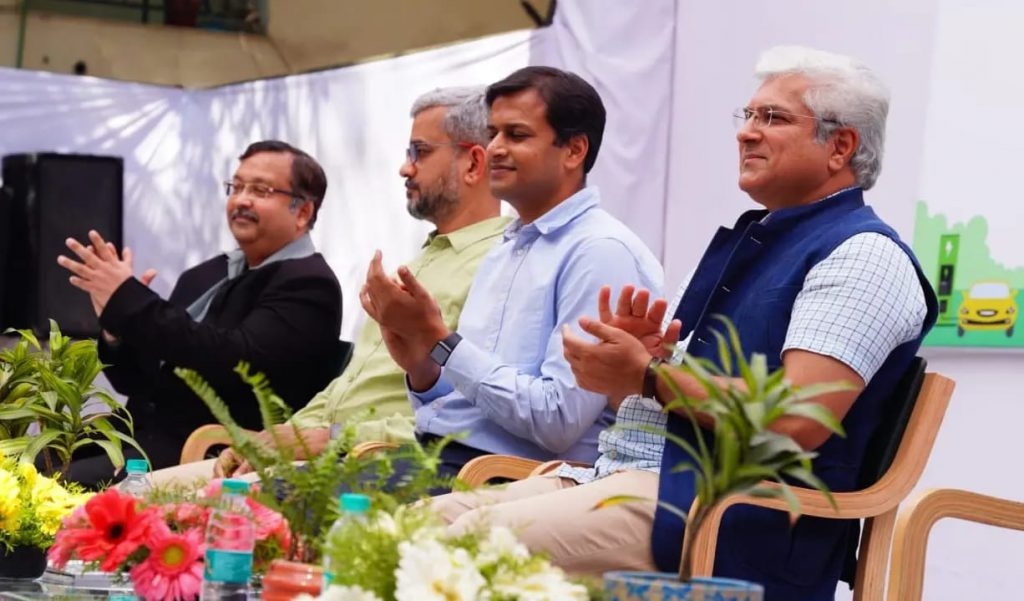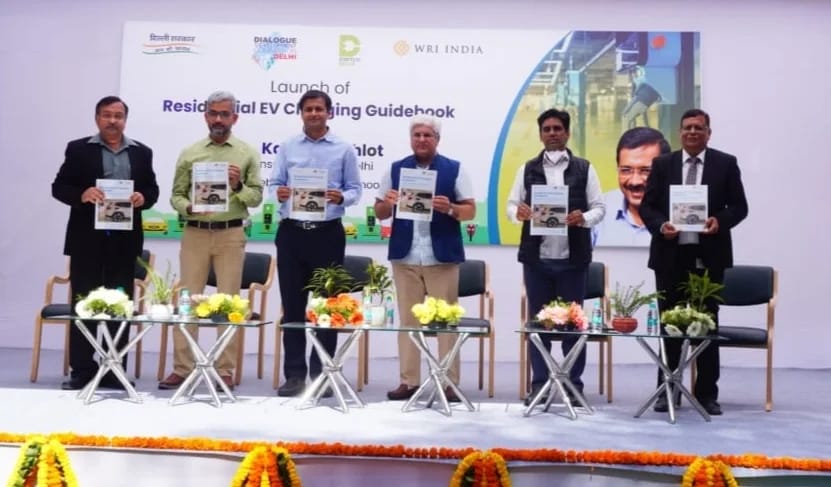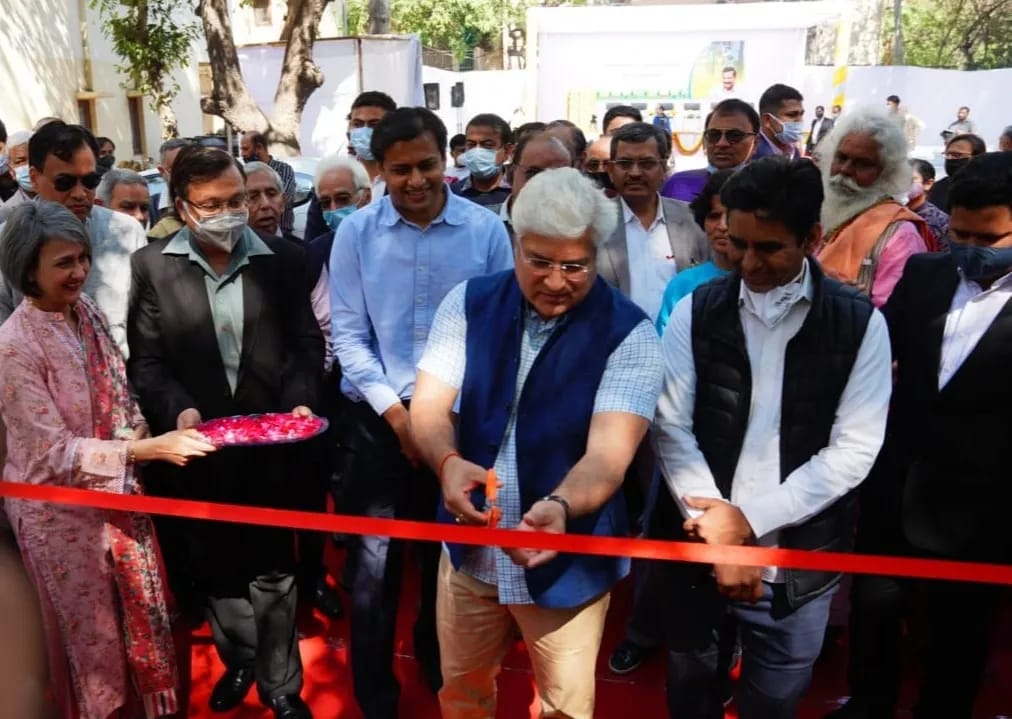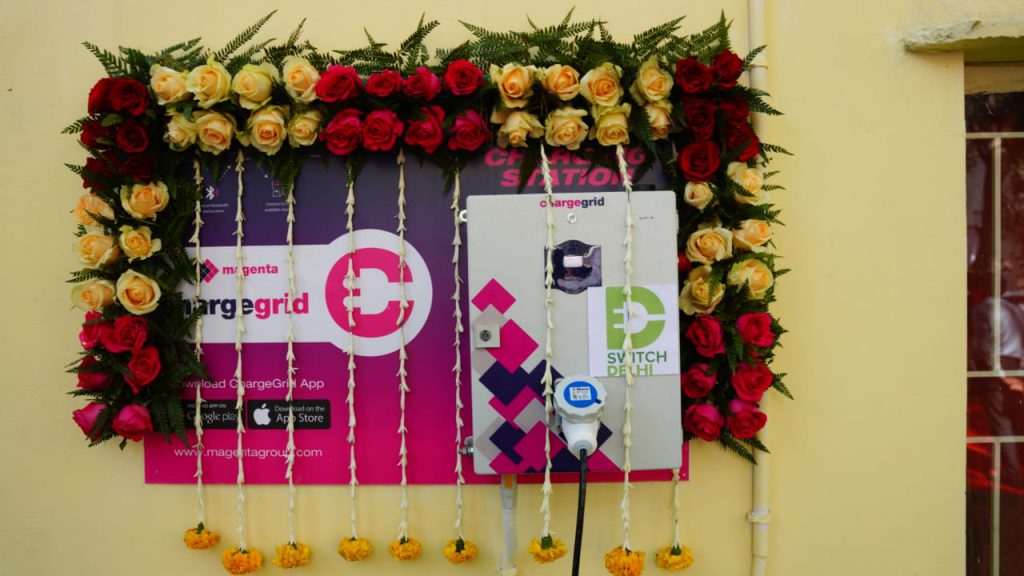The initiative will increase affordability and access of EV chargers to common citizens and make the installation process hassle free
Delhi becomes the first state government in India to make residential societies and RWAs an integral part of its EV mission
Transport Minister Kailash Gahlot along with DDC VC Jasmine Shah inaugurates EV charging station under the single window facility at RWA, Vasant Kunj
The guidebook will ensure that citizens are well informed about the charging infrastructure installation and benefits government is providing: Kailash Gahlot
Through our comprehensive EV policy, we are not only providing demand incentives such as purchase subsidies and interest subventions, but we have also ensured incentives for EV infrastructure development: Kailash Gahlot
Today’s launch of the Residential Electric Vehicle (EV) Charging Guidebook is an important step to facilitate this activity and Delhi has become the first state government in India to make residential societies and RWAs an integral part of its EV mission: Jasmine Shah

New Delhi:
The Dialogue and Development Commission of Delhi (DDC) and World Resource Institute (WRI India) launched Residential EV charging guidebook during an event at Sector A, Resident Welfare Associate, Vasant Kunj. The guidebook has been developed with an objective to provide step by step guidelines for Delhiites to set up EV charging stations at their premises. It addresses the common concerns of RWA or Residential complexes like Space planning not limiting to present EVs in RWA, choosing the right mix of EV chargers, power load management etc and sharing best practices for RWAs.

During the occasion, Chief Guest of the event, Shri Kailash Gahlot, Transport Minister, GNCTD along with Shri Jasmine Shah, Vice Chairperson of the Dialogue and Development Commission (DDC) of Delhi also inaugurated 2 EV charging stations within the premises of RWA. The charging stations are part of 30,000 charging points that will benefit from the INR 6000 of available subsidy under this initiative. Under Switch Delhi campaign, the government has developed a single window facility for citizens to make application for installation of EV charging point and avail the subsidy from the comfort of their homes without any hassles. With the subsidy, one can buy a 3.3 kW LEVAC charger for less than INR 2500 in comparison of existing market price of the charger at more than INR 8500.

As part of the initiative, the three DISCOMs namely BRPL, BYPL and TPDDL have already empaneled more than 10 EV charger vendors, which will be providing trusted and certified chargers to citizens as per the standards stipulated by the government. One can submit a request for EV charging point installation in less than 5 mins along with EV charging connection (if required) through their respective Discom’s Switch Delhi webpage. The government has mandated an electricity rate of INR 4.5 per unit for all such EV connections, which is among the lowest in India. Under the initiative, more than 100 requests have already been received by 3 DISCOMs and installation of 19 EV charging points have already been completed comprising of both private and semi-public usages.

The launch of Residential EV charging guidebook was attended by CEO of BRPL, Mr Rajesh Bansal with special invitees as Naresh Yadav, MLA Mehrauli area, and representations from RWA associations like URJA and Federation of CGHS, Dwarka association. Through this guidebook, Delhi government seeks to encourage all Residential complexes to join hands in promoting Electric vehicles by adopting EV charging at their places. Delhi Government has already taken several steps, including directing all existing commercial and institutional buildings, with a parking capacity of 100 or more vehicles to reserve 5% of their parking space for EVs with suitable EV chargers with a minimum output of 3.3KW. In addition, as per Delhi Development Authority’s amended United Building Bye Laws (2016), 20% of parking capacity in all new constructions, must be provided with charging infrastructure for EVs.
Delhi government have already adopted a forward-looking comprehensive EV policy on 7th August 2020, with a vision to promote faster adoption of electric vehicles in the city and to make Delhi, the EV capital of India. With an aim to improve Delhi’s air quality, it envisages Electric vehicle sales to reach 25% of all new vehicles by 2024. In 2021, EV sales in Delhi contributed to 5.6% of total vehicle sales, highest in India whereas in the month of Dec 2021, this share was more than 10% for the national capital. Good to see that 13% of total private electric 4W sold in India in 2021, were from Delhi only.
Shri Jasmine Shah, Vice Chairperson of the Dialogue and Development Commission (DDC) of Delhi, speaking at the event said, “It is a matter of great pride that Delhi’s residential societies have decided to join the EV revolution under way in Delhi by committing to setup EV chargers through Delhi govt’s single window facility. Today’s launch of the Residential Electric Vehicle (EV) Charging Guidebook is an important step to facilitate this activity and Delhi has become the first state government in India to make residential societies and RWAs an integral part of its EV mission. This will go a long way forward in achieving the vision of CM Arvind Kejriwal of setting up an EV charging station within 3 km radius from any point in Delhi and to make Delhi the EV capital of India.
Amit Bhatt, Executive Director, Mobility Initiatives, WRI India mentioned that Research suggests, most of the private motor vehicles are parked for 95% of the time in the parking spaces of residential societies. This provides an excellent opportunity to charge these vehicles if they are electric. Therefore, with the launch of the Residential EV charging Guidebook, the Delhi Government has addressed the most important aspect of EV charging, which is home charging.
Transport Minister of Delhi Shri Kailash Gahlot further stated “Under the visionary leadership of Shri Arvind Kejriwal, our government is committed to make Delhi the EV capital of India. We unveiled a comprehensive EV policy in August 2020 with an objective to achieve a target driven EV adoption in the city by 2024. Through the policy, we have ensured that we do not only incentivize purchase of EVs through demand side incentives but also boost supply side infrastructure such as charging point development through subsidies to citizens and last mile handholding. Single Window facility for charging point installation at private and semi-public places is a unique initiative and would ensure accessibility and affordability of charges for Delhi citizens and reduce their anxiety towards EV adoption. We are confident to ensure access to sustainable transportation to all citizens for Delhi through our holistic initiatives”.
